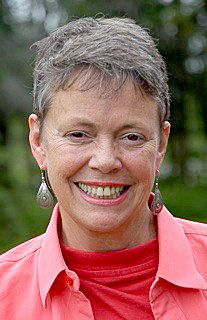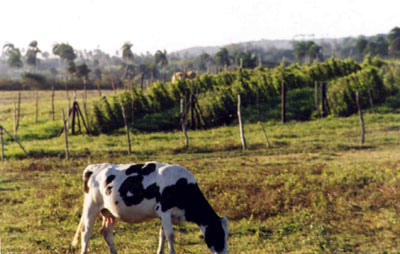 |
| Canadian agrologist Wendy Holm takes farmers, chefs and students on working tours of Cuba, where they help establish research plots in sustainable dairy production, learn about local foods and food preparation, enjoy Cuban culture, and more. Photo courtesy of Wendy Holm. |
Wendy Holm of Vancouver, B.C., has, for 34 years, been an agrologist (a professional designation in Canada for experts in agricultural science). She is also an economist with an award-winning background in public policy and is tremendously concerned about the harmful effects of bad policy on agriculture in her country.
As she became increasingly frustrated with that policy, she also became interested in Cuba – especially after taking a working vacation there a decade ago. Since then, she has led many trips of farmers and others to Cuba to learn about sustainable agriculture. At a talk on April 5, 2008, arranged by the Brunswick Trinidad [Cuba] Sister City Association and cosponsored by MOFGA’s El Salvador Sistering Committee, Holm discussed her work.
In 10 years, she said, Cuba “went from large monoculture sugar, more tractors per hectare than any other country in the world, to world leadership in organic agriculture. They completely changed the system” after the Soviet Union (Cuba’s major market for exports and major supplier of agricultural inputs) collapsed. At first, “It was a terrible, terrible time for Cuba.” Adults lost 20 or 30 pounds. Women fried grapefruit pulp as a meat substitute.
But Cubans used their strengths to switch to organic agriculture: They returned to traditional campesino methods; used their strong science academies to develop biological controls; used their wonderful agricultural extension system and strong cooperatives and farmer organization; and had the commitment of the government.
Change came fast. In 1999, the Swedish Parliament gave its Right Livelihood Award to Cuba over some 78 other nations for Global Excellence in Organic Agriculture. In 2006, the World Wildlife Fund declared Cuba the only nation to reach the WWF definition of sustainability based on its ecological footprint and social development index.
After her first visit, Holm wrote a column called “Falling in Love with Cuba,” and immediately some 20 farmers told her they wanted to visit the country with her. Thus began her farm tours – “building bridges and collaboration between our farmers and Cuba’s farmers.” Since 1999, 480 Canadian farmers in 23 delegations have gone to Cuba with Holm. She also raised enough money to bring 27 Cubans to British Columbia; and she’s taken a group of entomologists, two groups of chefs, and two (soon three) groups of students from her University of B.C. International Field Studies in Sustainable Agricultural course (a 21-day trip around Cuba). The third trip will even include a Guatemalan student, Jose Juan Perez Orozco, who is focusing on sustainable agriculture in Latin America while at College of the Atlantic. (Donations collected at Holm’s talk, plus the donation that Holm received for the talk, supplied the $1,000 scholarship enabling Perez to join the student group.) The students will also visit Trinidad in order to greet Brunswick’s Sister City.
Holm’s partner in the farmer-to-farmer program is ANAP, the national association of farmers in Cuba. The Canadian and Cuban farmers’ first project has been to help move Cuba toward self-sufficiency in sustainable dairy production, based on rotational intensive grazing; solar-powered electric fences; on-farm feed production; and using best farm and herd management practices. Before the collapse of the Soviet Union, Cuba produced all of its needed dairy; after, production dropped dramatically. Now most Cuban cattle rely on corn gluten for dietary protein, a byproduct of U.S. ethanol production, mostly from genetically engineered corn. Cuba guarantees a liter of milk per child per day up to age seven, and a liter of yogurt to age 14, and half its milk is imported (as skim milk powder) to fulfill those policy requirements. That transportation is environmentally and economically costly.
 |
| Cubans have a system of rotational grazing in which “pedestals” of legumes grow on wire trellises and are intercropped with strips of grasses. Animals eat the proper amount of legumes and grasses for to meet their dietary needs. The system works well with sheep, but Cubans questioned its economics with cows, so Holm helped establish research plots to test it. Photo courtesy of Wendy Holm. |
Holm’s dairy trial is in a cooperative in Los Palos, in Habana Province, not far from Havana. Rotational grazing (grazing a small paddock and moving cows to fresh paddocks regularly), she explained, ensures that cows have fresh food daily; take up more nutrients; and that a cow’s energy goes into milk production rather than foraging. The system also reduces soil compaction and deposits manure in the same places where nutrients were removed (as forage).
Rotational grazing, used widely in Canada, is being mixed with a Cuban system invented by Raul Castro and called “pedestals” – trellises supporting tropical legume “hedges” of Glycenia. Legumes sown under tent-shaped, wire trellises grow out through the wire, where cows “prune” the plants without pulling them up. Strips of grass alternate with trellises. The legume-grass system gives high-lactating cows, in their first 130 days of lactation, their needed 21% protein. As lactation drops, cows are moved to grass pastures. Pedestals work well in Cuba with sheep, which take less management than dairy cows. The pedestal system won’t work in Canada’s cold climate.
Questioning whether the expense of constructing pedestals was worthwhile, even though their purebred Holsteins went from 8 to 12 liters of milk with the system, Cuban farmers then tried a silvopasture system, with leguminous trees planted in grass pastures. This system had cows wandering all over the field and grazing trees excessively – or not being able to reach the green growth in taller trees.
So Holm and Canadian and Cuban farmers are now comparing combined pedestals and rotational grazing with rotational grazing without pedestals. Three hectares of pedestals offer 52 micropastures per hectare for five or six cows per micropasture on a 52-day rotation. Rotational pastures without pedestals are 1/4 hectare in size, are separated by single-wire, solar-powered electrical fences, and have 12 to 15 cows per hectare. Holm noted that the Cubans have some of the most advanced electrical fencing in the world. Other trials are looking at producing ration crops; finding the best grass forage species; and evaluating silvopasture.
Another focus of Holm’s work is separating calves from cows at birth, hand-rearing them and getting their rumens ready for milk production earlier than in traditional Cuban systems. They are bottle-fed and receive colostrum for the first several days.
Holm’s pilot project that included pedestals tripled milk production in one year, from 3.5 to 10 liters/cow/day, with an anticipated 15 to 20 liters in the future; increased income from milk sales by 140%; reduced herd mortality from 50% to zero; and won the 2007 AMEC Award for Sustainable Development of Natural Resources or Protection of the Environment at the 15th Annual Canadian Awards for International Cooperation, sponsored jointly by the Canadian Manufacturers and Exporters and the Canadian International Development Agency. (AMEC is an engineering company. For comparison, milk production in Canada normally averages 45 to 50 liters/cow/day – but with a high-input system.)
The next project, three years in scope, in the city of Bayamo, will try to adapt the rural dairy production model to a 56-hectare peri-urban area with a herd of about 50 cows. Because Bayamo is droughty, sewage from urban households (not from industrial outflows), which now runs into a river, will be put through constructed wetlands and then will irrigate pastures. Other aspects of the rural model will be trialed (pedestals and rotational pastures; solar-powered electric fencing; on-farm ration formulation; calf management). The project will also reforest the riverbank and create public spaces; and educate the community about nutrient recycling and sustainable dairy production.
Canadians who go on Holm’s trips learn about replacing farm chemicals with biocontrols (Canada now imports predatory Trichogramma wasps from Cuba) and see that achieving large-scale organic production requires support from the state. Farmers “spirits are lifted,” said Holm, when they go to a country where farmers are so respected that they make more than doctors and lawyers; where high school students work in the fields in the morning and in classrooms in the afternoon, so that everyone knows how important food production is; where policy supports sustainable farmers; and where farmers have a tremendous voice. In addition, the people-to-people connections are fulfilling.
Holm concluded that to be sustainable, farmers and communities need respect, dignity, and sovereignty over food policy, i.e., the right to make their own decisions. She thinks that Cuba should be able to be self-sufficient in sustainable dairy production within five or six years.
Holm is planning a research delegation for Maine organic farmers for 10+ days in mid-November 2008. Details will follow. The farmers will travel under a general license, meaning that, according to U.S. law, they have to be employed full-time in agriculture and interested in learning about innovative techniques while in Cuba. Please note that accompanying spouses, partners or friends are not covered by general license unless they, too, are full time farming. For more information, please contact Tina Phillips, [email protected].
Resources
Wendy Holm’s Web site: www.theholmteam.ca
Sustainable Agriculture and Resistance
Transforming Food Production in Cuba
Food First Books
Food First/Institute for Food Development Policy
Oakland CA
510-654-4400
[email protected]
www.foodfirst.org
FIDEL
Documentary film by Estela Bravo
Mongrel Media Inc.
109 Melville Ave.
Toronto, Ontario, Canada M6G 1Y3
416-516-9775
Fax: 416-516-0651
www.mongrelmedia.com
[email protected]
– Jean English
